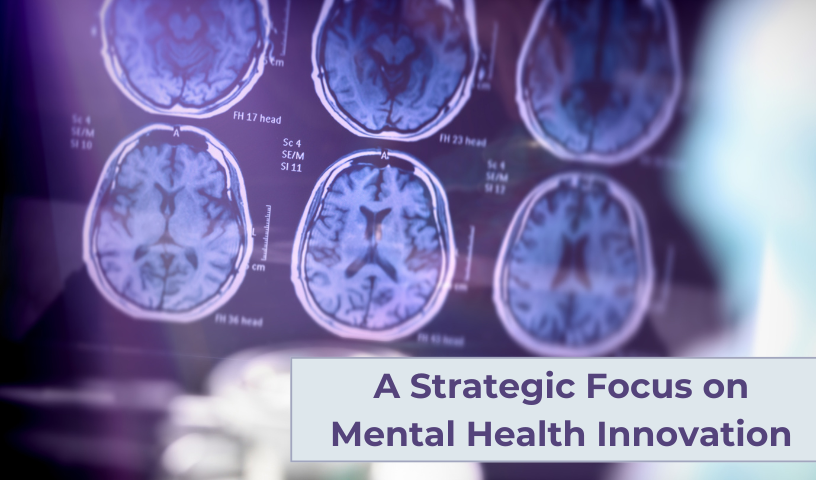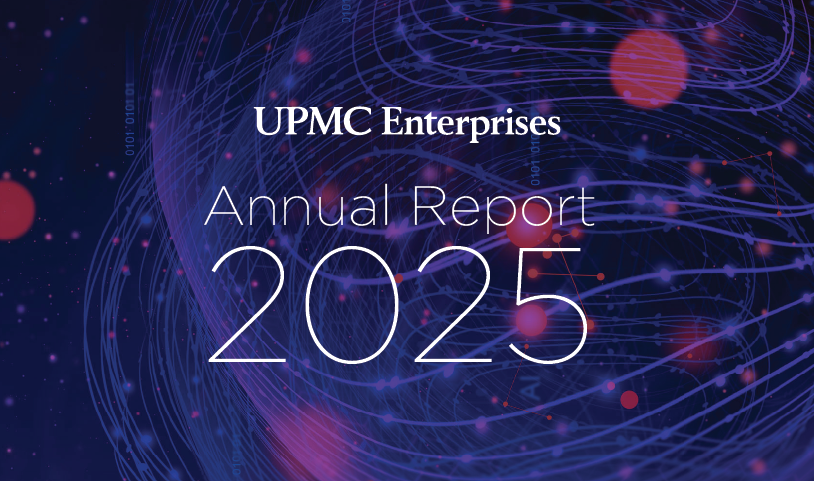
Jul 31, 2024
Mindful Investing: How UPMC Enterprises Supports Innovation in Brain Health
Mental health, behavioral health, cognitive decline, and other disorders of the brain are no longer shadowed by stigma. In recent years, the dialogue around brain health has undergone a profound transformation and is increasingly recognized as a cornerstone of overall well-being.
However, despite growing awareness, critical gaps in both effective therapeutics and access to supportive services remain for patients. Addressing these gaps calls for innovation, which is the mission of UPMC Enterprises.
As the innovation, commercialization, and venture capital division of UPMC, Enterprises supports one of the nation’s leading health systems — which is nationally recognized for mental health treatment through the UPMC Western Psychiatric Hospital. UPMC Western Psychiatric offers condition-specific treatment by an extensive network of expert professionals.
But even with that expertise, Enterprises is highlighting its strategic focus on mental health and the benefits in human capital, productivity, and societal well-being that can follow innovation and investment in this area. Through the division’s Translational Sciences and Digital Solutions focus areas, we are examining the opportunity to advance this important area of care.
Translational Sciences: Investing in Innovative Therapeutics
Most drugs on the market for mental illnesses today are no more effective than first generation therapeutics introduced more than 50 years ago. Current medicines lack clear mechanistic connections, have troubling side effects, and exhibit delayed or marginal results. For example, lithium carbonate has been used since the 1950s as a mood stabilizer primarily for the treatment of bipolar disorder and remains a cornerstone in bipolar management today despite its clear limitations and side effects.
One of our portfolio companies, Cerevance, is a biotech company developing novel therapeutics for debilitating central nervous system disorders. Cerevance’s compound CVN766 is in Phase II development for psychiatric conditions and has demonstrated safety and tolerability with no signs of somnolence in the clinic. The compound also has shown efficacy in preclinical models. The drug may benefit a variety of psychiatric indications including but not limited to: schizophrenia, anxiety/panic disorder, binge eating disorder, substance use disorder, and Prader-Willi Syndrome. If approved, this drug will address profound unmet medical needs, and, thus, improve quality of life for countless patients.
Additionally, the team is exploring additional opportunities in this space and has collaborated with world-class leaders from the University of Pittsburgh’s esteemed department of psychiatry to conduct a market landscape on neuropsychiatric therapeutics. The work has highlighted the importance of precision medicine in the context of psychiatric disorders — an area which has traditionally been dominated by one-size-fits-all approaches. A better mechanistic understanding of disease, new biomarkers including EEG and imaging, and trial endpoints have the potential to transform the space and create new investment opportunities.
Building on this work, Dr. Hank Safferstein, a Senior Advisor on the Translational Sciences team and CEO of Generian, moderated a panel discussion at the 2024 BIO International Convention in San Diego titled “Promising Advances in Neuroscience: New Molecular Targets and Biomarkers.” The panel, which featured Dr. Susanne Ahmari, Associate Professor in the Department of Psychiatry at University of Pittsburgh, Dr. Amit Etkin, Founder and CEO of Alto Neuroscience, and Craig Thompson, CEO of Cerevance, addressed the national mental health crisis and the promise and strides made in the field of precision psychiatry.
Equipped with valuable insights and timely knowledge from this ongoing work, the team is poised to make well-informed investment decisions, effectively mitigate risks, and capitalize on opportunities in this dynamic and ever-changing market.
Digital Solutions: Improving Access with Innovative Tools
Beyond limitations in the pharmaceutical management of psychiatric disorders, disparities in access to mental health care services, particularly in underserved communities or rural areas, exacerbate the burden on both the afflicted patients, their families, and the health care system. Furthermore, this lack of access is associated with increased emergency room visits, higher rates of hospitalization, increased demand on primary care providers, and greater long-term health care and societal costs.
The Digital Solutions team at Enterprises has a strategic focus on advancing tools that can improve mental health care while lowering costs. To this end, the Digital Solutions team has conducted a strategic analysis exploring opportunities in digitally enabled behavioral health services.
The team conducted interviews with providers across UPMC, including experts from Western Psychiatric, Family Medicine, Trauma and Crisis Centers, Community Care Behavioral Health, and UPMC/Pitt Research and State Grants. With more than 75 companies documented so far, the effort is arming the team with a better understanding of the field and areas of promise for future investment.
Separately, the Digital Solutions team has also pursued an opportunity in the cognitive health and impairment space, recognizing the growing prevalence of issues of cognitive decline and a need to innovative solutions.
One such example is BrainCheck, a medical technology company focused on improving access to cognitive health care and transforming screening for Alzheimer’s and related dementias. In 2021, UPMC Enterprises became a strategic investor in BrainCheck, which is working to bridge the growing gap in cognitive health screening and care in the United States. While the number of seniors with dementia is expected to triple in 30 years, there is a limited number of neurologists suited to perform cognitive impairment screening.
BrainCheck’s solutions offer rapid, reliable resources to support accurate assessments, stratify individual risk, and deliver actionable insights that can help all stakeholders — patients, caregivers, providers, and risk-bearers.
Conclusion: An Active Approach at UPMC Enterprises
Taken together, limited pharmaceutical development and constricted access to services create a massive burden for patients, loved ones, health care systems, and society.
Seeing this void, UPMC Enterprises is taking an active approach by leveraging our great internal network to invest in the development of novel therapeutics and new models of care access to drive solutions for the millions affected by psychiatric disorders.
Next Steps
Are you interested in learning more about our focus on mental health and how we might partner with your company? Contact our investment teams to find out if your company or innovation ideas fit with our approach to innovation.


